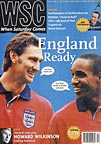 The Euro 2000 play-off draw has pitted the two oldest foes in Football against each other, but does anyone outside of Britain care?
The Euro 2000 play-off draw has pitted the two oldest foes in Football against each other, but does anyone outside of Britain care?
“I would not be Kevin Keegan if I did not get excited about this,” said the England manager in a blinding flash of self-awareness on hearing the Euro 2000 play-off draw. Unfortunately, he is Kevin Keegan, and his face was splashed all over the papers after England and Scotland came out of the hat together (or what passes for a hat at UEFA headquarters these days).
Mostly he was pictured in action in those nasty Admiral shirts from the mid to late Seventies, when England had a good run of results against the Scots, but couldn’t qualify for a major tournament to save their lives. Indeed, not for the first time since he took over as England manager, Keegan’s public pronouncements make him sound like someone frozen in time somewhere around 1978 then brought back to life in the late Nineties, an era he seems to find incomprehensible.
Managers now, it seems, are expected to do more to prepare a team than yell and shake their fists in the dressing room before kick off. Keegan’s constant exhortations for the players to show some passion seem little better than a smokescreen for the fact that to date he has shown no sign of getting to grips with the tactical or strategic requirements of the job.
Partly it is a question of credibility. It’s possible to imagine England players listening to instructions given them by Terry Venables or even Glenn Hoddle, pre-France 98. It’s harder to believe that they would take note of tactical advice from Keegan, even if he had any to offer.
Keegan’s supporters like to present him as a “character”, but if he is then it is only in the same sense as a saloon bar bore like Richard Littlejohn, as anyone subjected to Kev’s dire punditry during France 98, with its repository of clanking cliches and quaint racial stereotypes, will remember.
It wasn’t only the all-too-frequent sight of Keegan in his bubble-permed pomp that gave the impression of football going back in time. The whole idea of the England v Scotland grudge match seems outdated. Gone are the days when the England players would live in fear of a verbal roasting from their Scottish club colleagues if they lost the international. Apart from Alan Shearer, they haven’t got any. For most of the younger English players, the rivalries that mean most these days are European club ties or a match like England v France with plenty of confrontations between Premiership team-mates.
To add to the nostalgia, the violence that was dragged up as an example of why the “Battle of Britain” fixture was terminated was almost always the picturesque goalpost-smashing antics of 1977, rather than the altogether nastier reality of the late 1980s, when England’s hooligans decided to take the fight to Glasgow. If there is trouble this time around, or at Euro 2000, you can bet it will be more like the latter than the former – localised, harder to photograph and much more frightening.
To the rest of the football world, the England v Scotland tie will be an encounter between two moderate international teams with fading reputations. To our press, it still has to be Jocks Away and, with that customary determination to locate Britain at the centre of the world, Match Of The Millennium. To an extent the media build-up to the match panders to a superiority complex identifiable among some England fans.
Yet perhaps if Keegan were not in charge, some of the more frenzied outpourings would have been toned down. Any of his three predecessors might have had something pertinent to say about the prospects for the match itself, even if they did not feel inclined to share them with the media. But Keegan can neither talk sense nor shut up at the appropriate moment. Instead he babbles on using the sort of language that he might have picked up from his own ghosted autobiographies: “It will be passionate, full of pace and frantic. There will no quarter asked or given.”
The Scottish management’s more phlegmatic approach illustrates that their expectations are of a different nature to England, their perception of their place in world football having shifted considerably downwards over the past two decades. Securing a place among the best 16 teams in Europe would be achievement enough, especially if it involved beating England on the way.
England still expect more. But the values and methods of the 1970s aren’t going to do the trick when the rest of the world has moved on.
From WSC 154 December 1999. What was happening this month